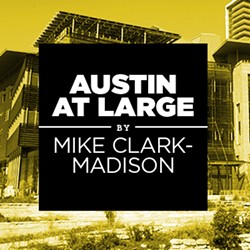Austin @ Large: Austin at Large
Don't Just Sit There ... Council's economic strategy: Do ... something. Now. But what?
By Mike Clark-Madison, Fri., April 18, 2003

And so it did. Since the task force made its first report to the City Council in December, its three subcommittees -- focusing on "traditional industries," on small business, and on cultural vitality ("keeping Austin weird") -- have cogitated and surveyed and, no doubt, heard a lot of complaining about the City Hall status quo. Their three sets of findings do an admirable job of capturing, and responding to, the angry and aggrieved cries of the citizenry to Do Something about the bust. A lot of Somethings, actually. But it's still a little vague as to what the end result of this Doing is supposed to be. When the task force effort is finally complete in, oh, June or so, City Hall will have a lengthy list of action items that taken in toto can be dubbed an economic strategy. But what is that strategy designed to do?
What Kind of Future?
In fairness, this is a question that Wynn or Dunkerley or the rest of the council or the task force cannot really answer on their own. Austin right now is rather deeply divided on what its economic future should be. Should the goal of a city economic policy be to get Austin "back on track" -- that is, the same track we were on before the boom derailed in 2000? Or should we try to use this as an opportunity to change direction and head for territory where the boom-bust cycle is less pronounced? Looking at the task force subcommittee findings, one senses an effort to address both of these goals without quite resolving the tension between them.
This may reflect the fact that Austin's 1990s boom looks different in the rear-view mirror than it did in the headlights. During most of the 25 years before the boom, when Austin last seriously played the industrial-development game with high tech as its prize, considerations like affordability or cultural vitality or natural beauty or even the entrepreneurial small-biz climate were minor themes in the Austin sales pitch. We knew we had an educated workforce, but that's different from being a mecca of the "creative class." Now, in retrospect, we can plausibly argue that Austin's hyperactive 1990s economy was, at most, only partly spawned by MCC and Sematech, or the availability of cheap water and power, or the proximity to UT. It was equally spawned by Liberty Lunch and SPAMARAMA®, the availability of cheap housing, and the proximity to Barton Creek.
All those latter elements are now under threat, and the task force findings go some -- but not enough -- of the way to warding off those threats. The subcommittee reports say little, if anything, about affordable housing or a better transportation system, both of which would be a great help to the creative-class talent presumed to be the ground troops in Austin's war against the bust. But we should be happy enough, I suppose, that the best and brightest minds of the Austin elite think cultural health and small business success are important components of our economic recovery.
Take Another Spin That doesn't mean cultural vitality and small business success are ends in themselves, which is how they appear (at least to me) when reviewing the task force findings. The "traditional industries" committee -- tasked with devising a next-generation strategy for public-private partnership, incentives, and industrial recruitment -- is the only one of the three whose findings contain the germ of a goal, of a future Austin economy that's tailored to the particular needs, strengths, and desires of this community. What kind of new industries? What wages do they pay? Can they use local talent? Will they leverage our local assets? Can they be helped by the level of inducement the city can, structurally and politically, be expected to provide?
These are all questions that can and should also inform city support of small business and of cultural endeavor. But the task force findings reflect the political perception that those things are simply good things and have no potential downsides. We thought that about high tech, too, and the reality was rather different. Certainly the recommendations of the task force in these areas are worth pursuing; indeed, some of them are common sense. But this observer thinks the whole task force effort basically needs to be spun around one or two more times so that its center can coalesce -- so the citizens can look at the city's economic strategy and know that, if it succeeds, Austin will be the kind of place where they want to live.
That's one step beyond the task force's current mandate, which is simply to show that City Hall and the City Council aren't just sitting on their hands. It certainly accomplishes that goal, but the silver lining to the bust is that it gives us a chance to do more than just Doing Something. Perhaps after the election, Wynn -- be he mayor or private citizen -- can help the city take that chance. ![]()
Got something to say? The Chronicle welcomes opinion pieces on any topic from the community. Submit yours now at austinchronicle.com/opinion.






